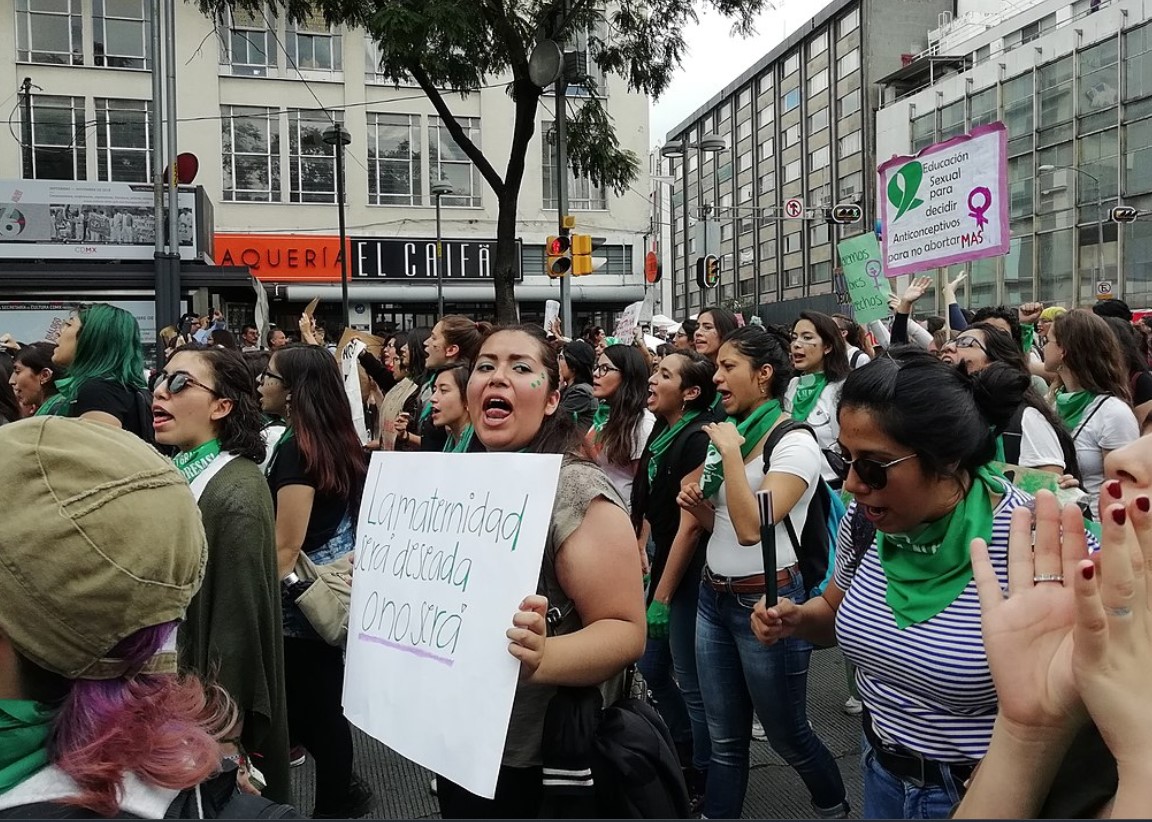Mexico’s Supreme Court Decriminalizes Abortion Nationwide
In a groundbreaking decision, Mexico’s Supreme Court has overturned all federal criminal penalties for abortion, declaring that national laws prohibiting the procedure are unconstitutional and infringe upon women’s rights. This sweeping ruling aligns with the growing trend in Latin America to expand access to abortion services.

Marcha en el día de Acción Global por un aborto legal y seguro. Wotancito, CC BY-SA 4.0, via Wikimedia Commons
The high court has ordered the removal of abortion from the federal penal code, mandating that the federal public health service and all federal health institutions must provide abortion services to anyone who requests them. This ruling ensures that neither women nor pregnant individuals nor healthcare workers can face punishment for seeking or providing abortions, as stated by the Information Group for Chosen Reproduction (GIRE).
It’s worth noting that around 20 Mexican states still have laws criminalizing abortion. While judges in these states will be bound by the Supreme Court’s decision, further legal efforts will be necessary to completely eliminate penalties for abortion across the nation.
Local Journalism for Working stiffs
We write for the poets, busboys, and bartenders. We cover workers, not ‘tech’, not the shiny ‘forbes 100 bullshit’. We write about the business on your corner and the beer in your hand. Join the Bay's best newsletter.
The ruling has sparked widespread celebrations on social media platforms, with Mexico’s National Institute for Women hailing it as a “victory and justice for Mexican women.” They view this decision as a significant step towards achieving gender equality. Former Supreme Court justice Sen. Olga Sánchez Cordero also praised the ruling, emphasizing its contribution to a more just society that respects the rights of all individuals. She called on Mexico’s Congress to pass relevant legislation in response to this historic decision.
“Today is a day of victory and justice for Mexican women!” @AP #ReproductiveRightshttps://t.co/axmPcRG63A
— The Narrative Project (@TNP_CT) September 7, 2023
However, in Mexico, a country with deeply rooted religious beliefs, there are voices of opposition. Irma Barrientos, director of the Civil Association for the Rights of the Conceived, expressed the determination of opponents to continue their fight against expanded abortion access, citing the U.S. as an example where the Supreme Court reversed its abortion decision after 40 years.
The Supreme Court’s justification for its decision on abortion is rooted in its belief that the legal system criminalizing abortion in Mexican federal law is unconstitutional, as it violates the human rights of women and individuals with the capacity to gestate. This ruling follows a previous decision by the court two years ago, where it determined that abortion was not a crime in one northern state, subsequently leading to a gradual process of decriminalization on a state-by-state basis. Most recently, the central state of Aguascalientes became the 12th state to eliminate criminal penalties for abortion.
While Wednesday’s decision by Mexico’s Supreme Court marks a significant milestone for abortion-rights activists, the path to full legalization remains a state-by-state effort. However, this ruling is expected to facilitate the process. State legislatures also have the authority to independently remove abortion penalties.
It’s essential to clarify that the ruling doesn’t automatically grant immediate access to abortion for all Mexican women, as explained by Fernanda Díaz de León, a sub-director and legal expert for the women’s rights group IPAS.
In theory, what the ruling accomplishes is the obligation placed on federal agencies to provide abortion care to patients. This obligation is likely to have a ripple effect in several ways.
Firstly, removing the federal ban eliminates yet another excuse that care providers may have used to deny abortions in states where the procedure is no longer considered a crime.
Additionally, it opens up opportunities for women with formal employment who are part of the social security system and government employees. They can now seek the procedure in federal institutions, even in states where abortion remains criminalized, thus expanding access for a significant portion of the population.
For more on this story visit: apnews.com

Howdy! My name is Katy Atchison and I'm an Associate Editor for Broke-Ass Stuart.
I want to take the time to say thank you for supporting independent news media by reading BrokeAssstuart.com. Supporting independent news sources like Broke-Ass Stuart is vital to supporting our community because it amplifies the voices of a wide variety of diverse opinions. You also help support small businesses and local artists by sharing stories from Broke-Ass Stuart.
Because you're one of our supporters, I wanted to send over a pro-tip.
Our bi-weekly newsletter is a great way to get round ups of Broke-Ass Stuart stories, learn about new businesses in The Bay Area, find out about fun local events and be first in line for giveaways.
If you’d like to get our newsletter, signup right here, it takes 5 seconds.







